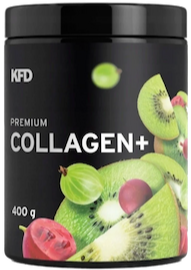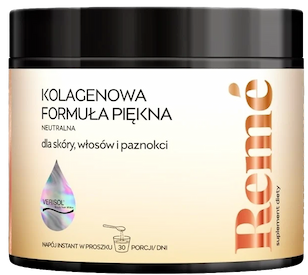Best collagen supplements for joints in 2025 [top 10 reviews]
Collagen for joints to drink and in tablets can effectively support joint health.


Learn more about our editorial process
.

Learn more about our editorial process
.

Learn more about our editorial process
.

Learn more about our editorial process
.![Best collagen supplements for joints in 2025 [top 10 reviews]](https://cdn-resources.natu.care/uploads/1/collagen_to_drink_hero_4c09ebfd3b.jpg)
Why you can trust us
Articles on Natu.Care are written based on scientific research, data from government websites and other reliable sources. The texts are written in cooperation with doctors, nutritionists and other health and beauty experts. Articles are reviewed before publication and during significant updates.
.Learn more about our editorial process
.Information about advertisements
Content on Natu.Care may contain links to products from the sale of which we may receive a commission. When creating content, we adhere to high editorial standards and take care to be objective about the products discussed. The presence of affiliate links is not dictated by our partners, and we select the products we review ourselves completely independently.
.Learn more about our terms and Conditions
.The World Health Organisation reports that 528 million people, or 15% of the population at the time, will suffer from osteoarthritis in 2019. And this is just one of many joint-related conditions. So it's no wonder that the popularity of collagen for joints is growing.
At the time of writing, 16,000 people a month are typing the phrase 'collagen for joints' into a search engine. Are there good reasons for this? Let's find out by confronting the statements of a doctor, a nutritionist, a master pharmacist, as well as by analysing scientific studies.
The following is a summary of the results.
From this article you will learn:
- Whether and how collagen works for joints. .
- Which collagen for joints is the best on the market. .
- Who should consider collagen supplementation for joints.
- Who should consider collagen supplementation for joints?
- Whether collagen for joints is safe for everyone. .

Sprawdź, jak może on zadbać o zdrowie Twoich stawów i urodę! Kolagen Premium (10 000 mg) wiśnia
Natu.Care Kolagen Premium Sport 10000 mg, wiśnia
Natu.Care Kolagen Premium dla zdrowia stawów, skóry, paznokci i włosów. Wołowy kolagen w optymalnej dawce 10 000 mg. Przebadany przez niezależne laboratorium.
Sprawdź cenę
Ten kolagen dobrze się rozpuszcza, super smakuje – jak taki soczek wiśniowy. Moje włosy przestały wypadać, są gęstsze i zdrowsze a cera promienna.@Dominika P.
See also:
- The best collagen on the market
- Best collagen for nails
- Best collagen for face
- Best collagen for wrinkles
- Best collagen for skin
- Best collagen for joints
- Best collagen for hair
- Best collagen for cellulite
- Best collagen for acne
- Best collagen for stretch marks
- Best collagen for scars
- Best collagen for bones
- Best collagen for drinking and collagen for drinking (effects)
Does collagen help joints?
Yes, collagen helps joints. Among other things, research suggests that it is involved in the production of synovial fluid, which is responsible for smooth movement, participates in the rebuilding of cartilage tissue, and improves joint flexibility. To see results, take 5-10 grams of collagen for at least three months.
What is the best collagen for joints?
The most powerful collagen for joints is hydrolysed collagen type II. Hydrolysis is a process that breaks down collagen into small particles (collagen peptides), which are very well absorbed by the body. In contrast, type II collagen is responsible for as much as 90% of all collagen in articular cartilage and 60% of its dry weight.
Which collagen for joints - ranking
I evaluated the formulation together with magister of pharmacy, Ilona Krzak, and clinical nutritionist, Julia Skrajda.
Number of collagens analysed: 86.
Number of finalists: 5.
Selection criteria:
- Content collagen. Scientific research suggests that an effective daily serving - which will support joints - is 2.5 to 15 grams hydrolysed collagenand.
- Origin. The best collagen is that which is sourced from certified sources.
- Type of collagen. Hydrolysed collagen is the best on the market. It features high bioavailability and joint supportand.
- Purity of formulation. The best collagen supplements contain no unnecessary fillers, flavours, preservatives.
- Additional active ingredients. Provides vitamins, minerals and other beneficial compounds.
- Testing and certification. Independent, accredited laboratories confirming the quality of the collagen formulation is a huge plus in the supplement market.
- Taste. Health is one thing and pleasure is another. But if you can have both, why not take advantage? Here you will see the full criteria.
Natu.Care Collagen Premium 5000 mg, mango-maracuja

- Collagen content: 5000 mg marine collagen hydrolysate
- .
- Additional active ingredients: vitamin C, low molecular weight hyaluronic acid (and L-theanine and coenzyme Q10 in cocoa flavoured collagen or vitamin A and vitamin E in mango–passion fruit flavoured collagen)
- .
- Form: powder sachets
- .
- Dose: 1 sachet per day
- .
- Sufficient for: 30 days
- .
Product description
Fish collagen from the Natu.Care brand in a dose of 5000 mg. The formula contains a sufficient portion of the active substance to positively affect your joints, musculoskeletal system and immunity.
Take care of your tendons, joint cartilage, ligaments, muscles and even bones by supplying them with the building blocks to function properly. Move without bólu and provide the necessary support for any physical activity.
And as a „gratis” to regular supplementation, you will also receive firm skinóhand, healthy and shiny hair and strong nails.
Natu.Care Premium Collagen is available in two flavours – Cacao Bloom and Rise&Shine. Both formulas are based on the following active ingredients: marine collagen hydrolysate, wild roseóbud extract and hyaluronic acid.
Additionally, Cacao Bloom contains natural L-theanine, coenzyme Q10 and defatted Dutch cacao. Rise&Shine instead contains vitamin E and vitamin A.
These are the best collagens in the world.
These best fish collagens on the market also rós taste – Cacao Bloom is a treat for chocolate lovers. Rise&Shine will appeal to those whoóenjoy the refreshing taste of mangoófruit and passion fruit.
Pros and cons
Fish collagen from the Natu.Care brand in a dose of 5000 mg. The formula contains a sufficient portion of the active substance to positively affect your joints, musculoskeletal system and immunity.
Take care of your tendons, joint cartilage, ligaments, muscles and even bones by supplying them with the building blocks to function properly. Move without bólu and provide the necessary support for any physical activity.
And as a „gratis” to regular supplementation, you will also receive firm skinóhand, healthy and shiny hair and strong nails.
Natu.Care Premium Collagen is available in two flavours – Cacao Bloom and Rise&Shine. Both formulas are based on the following active ingredients: marine collagen hydrolysate, wild roseóbud extract and hyaluronic acid.
Additionally, Cacao Bloom contains natural L-theanine, coenzyme Q10 and defatted Dutch cacao. Rise&Shine instead contains vitamin E and vitamin A.
These are the best collagens in the world.
These best fish collagens on the market also rós taste – Cacao Bloom is a treat for chocolate lovers. Rise&Shine will appeal to those whoóenjoy the refreshing taste of mangoófruit and passion fruit.
Additional information
Fish collagen from the Natu.Care brand in a dose of 5000 mg. The formula contains a sufficient portion of the active substance to positively affect your joints, musculoskeletal system and immunity.
Take care of your tendons, joint cartilage, ligaments, muscles and even bones by supplying them with the building blocks to function properly. Move without bólu and provide the necessary support for any physical activity.
And as a „gratis” to regular supplementation, you will also receive firm skinóhand, healthy and shiny hair and strong nails.
Natu.Care Premium Collagen is available in two flavours – Cacao Bloom and Rise&Shine. Both formulas are based on the following active ingredients: marine collagen hydrolysate, wild roseóbud extract and hyaluronic acid.
Additionally, Cacao Bloom contains natural L-theanine, coenzyme Q10 and defatted Dutch cacao. Rise&Shine instead contains vitamin E and vitamin A.
These are the best collagens in the world.
These best fish collagens on the market also rós taste – Cacao Bloom is a treat for chocolate lovers. Rise&Shine will appeal to those whoóenjoy the refreshing taste of mangoófruit and passion fruit.
User review
Fish collagen from the Natu.Care brand in a dose of 5000 mg. The formula contains a sufficient portion of the active substance to positively affect your joints, musculoskeletal system and immunity.
Take care of your tendons, joint cartilage, ligaments, muscles and even bones by supplying them with the building blocks to function properly. Move without bólu and provide the necessary support for any physical activity.
And as a „gratis” to regular supplementation, you will also receive firm skinóhand, healthy and shiny hair and strong nails.
Natu.Care Premium Collagen is available in two flavours – Cacao Bloom and Rise&Shine. Both formulas are based on the following active ingredients: marine collagen hydrolysate, wild roseóbud extract and hyaluronic acid.
Additionally, Cacao Bloom contains natural L-theanine, coenzyme Q10 and defatted Dutch cacao. Rise&Shine instead contains vitamin E and vitamin A.
These are the best collagens in the world.
These best fish collagens on the market also rós taste – Cacao Bloom is a treat for chocolate lovers. Rise&Shine will appeal to those whoóenjoy the refreshing taste of mangoófruit and passion fruit.
Natu.Care Collagen Premium 10000 mg, cherry

- Collagen content: 10,000 mg of hydrolyzed bovine collagen
- Additional active ingredients: vitamin C, low molecular weight hyaluronic acid, glucosamine, chondroitin, extract of Indian frankincense resin (boswellia serrata)
- Form: powder sachets for drinking
- Serving: 1 sachet per day
- Lasts for: 30 days
Product description
One of the strongest collagens on the market, providing as much as 10,000 mg per daily serving. This product can effectively support the condition of joints, skin, hair, and nails.
With this supplement, you will support your skeletal and joint system as well as your beauty, helping you visually halt the aging process and feel rejuvenated!
Pros and cons
Pros:
- The daily portion of collagen is very large – as much as 10,000 mg.
- Proven collagen formula – COLLinstant, whose effectiveness has been confirmed in clinical studies.
- Effective dose of hyaluronic acid, which additionally moisturizes the skin and positively affects joint health.
- Vitamin C supports the body's natural collagen production.
- Glucosamine is a fundamental building block of compounds found in joint cartilage and a component of collagen that gives elasticity to connective tissue in tendons.
- Chondroitin is a natural component found in the human body, mainly in cartilage. This large molecule (mucopolysaccharide) has the ability to absorb water, which helps maintain the elasticity and resilience of cartilage.
- Frankincense resin extract supports blood circulation and joint mobility and reduces their stiffness. It may help alleviate inflammatory conditions.
- The composition has been tested by the independent and accredited J.S. Hamilton laboratory.
Cons:
- None.
Additional information
Users praise Natu.Care Collagen Premium for the easy dissolving of the powder.
ALLDEYNN Collarose Fish
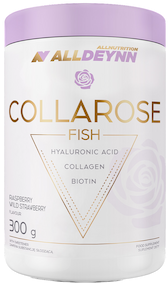
- Collagen content: 5000 mg hydrolysate fish collagen VERISOL F® .
- Additional active ingredients: vitamin C, hyaluronic acid, biotin
- Form: powder to dissolve in water .
- Dose: one scoop (6 g) of powder daily .
- Sufficient for: 50 days .
Product description
Atlantic cod collagen VERISOL F® contained in the formula are easily absorbed collagen peptides of fish origin. Regular supplementation can firm your skinóhand and slow down the ageing process. Your nails will become stronger and stop breaking. The addition of biotin will improve the condition of your hairów. The collagen portion is high enough to also have a good effect on your joints, muscles and bones.
Pros and cons
Atlantic cod collagen VERISOL F® contained in the formula are easily absorbed collagen peptides of fish origin. Regular supplementation can firm your skinóhand and slow down the ageing process. Your nails will become stronger and stop breaking. The addition of biotin will improve the condition of your hairów. The collagen portion is high enough to also have a good effect on your joints, muscles and bones.
Additional information
Atlantic cod collagen VERISOL F® contained in the formula are easily absorbed collagen peptides of fish origin. Regular supplementation can firm your skinóhand and slow down the ageing process. Your nails will become stronger and stop breaking. The addition of biotin will improve the condition of your hairów. The collagen portion is high enough to also have a good effect on your joints, muscles and bones.
Expert and user opinion
Atlantic cod collagen VERISOL F® contained in the formula are easily absorbed collagen peptides of fish origin. Regular supplementation can firm your skinóhand and slow down the ageing process. Your nails will become stronger and stop breaking. The addition of biotin will improve the condition of your hairów. The collagen portion is high enough to also have a good effect on your joints, muscles and bones.
DuoLife Collagen fish collagen 2500 mg
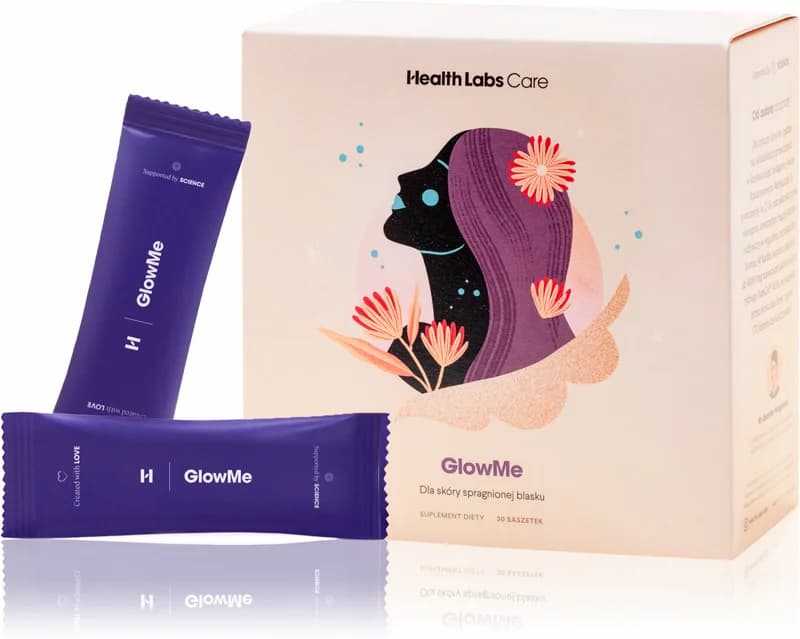
- Collagen content: 2500 mg collagen
- Additional active ingredients: vitamin C, silicon, glucosamine, hyaluronic acid, nettle and bamboo extracts
- Form: liquid to drink .
- Dose:25 ml .
- Sufficient for: 30 days .
Product description
100% natural collagen liquid without unnecessary ingredientsós. The composition of ingredientsós improves the appearance and condition of skinóry, hairów, nails. DuoLife is a good choiceór if you notice the first signs of skinóry ageing or want to stop this process. A tasty liquid, convenient to use.
Pros and cons
100% natural collagen liquid without unnecessary ingredientsós. The composition of ingredientsós improves the appearance and condition of skinóry, hairów, nails. DuoLife is a good choiceór if you notice the first signs of skinóry ageing or want to stop this process. A tasty liquid, convenient to use.
Additional information
100% natural collagen liquid without unnecessary ingredientsós. The composition of ingredientsós improves the appearance and condition of skinóry, hairów, nails. DuoLife is a good choiceór if you notice the first signs of skinóry ageing or want to stop this process. A tasty liquid, convenient to use.
User review
100% natural collagen liquid without unnecessary ingredientsós. The composition of ingredientsós improves the appearance and condition of skinóry, hairów, nails. DuoLife is a good choiceór if you notice the first signs of skinóry ageing or want to stop this process. A tasty liquid, convenient to use.
Pharmovit liquid collagen 10000 mg
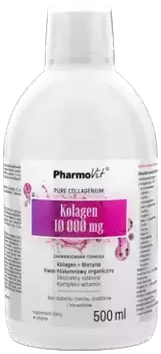
- Collagen content: 10000 mg hydrolysed bovine collagen types I and III .
- Additional active ingredients: hyaluronic acid, natural plant extracts, vitamin C, B vitamins, zinc, vitamin D
- Form: vials .
- Dose: 25 ml .
- Sufficient for: 20 days .
Product description
A solid daily dose of collagen for jointómuscle and bone health and beauty. The duo of collagen and vitamin C has a positive effect on each other, so that „the protein of youth” is better absorbed and more efficiently produced in the body.
Pros and cons
A solid daily dose of collagen for jointómuscle and bone health and beauty. The duo of collagen and vitamin C has a positive effect on each other, so that „the protein of youth” is better absorbed and more efficiently produced in the body.
Additional information
A solid daily dose of collagen for jointómuscle and bone health and beauty. The duo of collagen and vitamin C has a positive effect on each other, so that „the protein of youth” is better absorbed and more efficiently produced in the body.
KFD Premium Collagen+
Product description
High dose of collagen and a real bomb of vitamins C and D and organic sulphur. With this preparation the effects will come immediately. You will improve the firmness of your skin and reduce wrinkles. Your hair and nails will be strong and shiny.
A generous dose of collagen will improve the mobility of your jointsós, benefit your bone system and muscles. Do you do sports and need a product thatós able to keep up with your needs? This product will do the trick.
Pros and cons
High dose of collagen and a real bomb of vitamins C and D and organic sulphur. With this preparation the effects will come immediately. You will improve the firmness of your skin and reduce wrinkles. Your hair and nails will be strong and shiny.
A generous dose of collagen will improve the mobility of your jointsós, benefit your bone system and muscles. Do you do sports and need a product thatós able to keep up with your needs? This product will do the trick.
Additional information
High dose of collagen and a real bomb of vitamins C and D and organic sulphur. With this preparation the effects will come immediately. You will improve the firmness of your skin and reduce wrinkles. Your hair and nails will be strong and shiny.
A generous dose of collagen will improve the mobility of your jointsós, benefit your bone system and muscles. Do you do sports and need a product thatós able to keep up with your needs? This product will do the trick.
Expert opinion
High dose of collagen and a real bomb of vitamins C and D and organic sulphur. With this preparation the effects will come immediately. You will improve the firmness of your skin and reduce wrinkles. Your hair and nails will be strong and shiny.
A generous dose of collagen will improve the mobility of your jointsós, benefit your bone system and muscles. Do you do sports and need a product thatós able to keep up with your needs? This product will do the trick.
Product description
The dietary supplement from Remé contains beef collagen in a patented formula and vitamin C, whichóra aids its absorption. The formula comes in three flavours: neutral, orange-maracuja and strawberry-pomegranate. The formula can effectively support and improve the condition of the skinóry, hairóry and nails.
Pros and cons
The dietary supplement from Remé contains beef collagen in a patented formula and vitamin C, whichóra aids its absorption. The formula comes in three flavours: neutral, orange-maracuja and strawberry-pomegranate. The formula can effectively support and improve the condition of the skinóry, hairóry and nails.
Additional information
The dietary supplement from Remé contains beef collagen in a patented formula and vitamin C, whichóra aids its absorption. The formula comes in three flavours: neutral, orange-maracuja and strawberry-pomegranate. The formula can effectively support and improve the condition of the skinóry, hairóry and nails.
The dietary supplement from Remé contains beef collagen in a patented formula and vitamin C, whichóra aids its absorption. The formula comes in three flavours: neutral, orange-maracuja and strawberry-pomegranate. The formula can effectively support and improve the condition of the skinóry, hairóry and nails.
Product tiles contain affiliate links. As An Amazon Partner, I earn from qualifying purchases.
See also:
- How to choose collagen
- How to choose collagen to drink
- How to choose collagen powder
- How to choose collagen in sachets
- How to choose liquid collagen
- How to choose collagen in tablets
- How to choose collagen in capsules
How does collagen work for joints?
Collagen makes up around 60% of the dry weight of joint cartilage. It is therefore not surprising that many people are looking for information on the effects of this ingredient on joints. However, reliable data is lacking in most sources, so below you will find information that is based solely on studies with humans.
How does collagen work on joints?
Participates in the production of joint synovium
Collagen is a protein that is important for the health of joint tissue. This tissue - articular cartilage - contains a large amount of collagen, which forms a 'mesh'. This mesh provides structure and the ability to withstand pressure when walking, for example. Furthermore, collagen also helps to maintain the proper viscosity of the joint fluidand.
Joint fluid is a kind of 'lubricant' that is responsible for the proper movement of joints. Collagen has the ability to bind water, which is key to keeping the joint synovium hydrated and viscous.
The high viscosity of the joint lubricant helps to minimise friction between the ends of the bones in the joint, enabling smooth and pain-free movement..
 .
.
Julia SkrajdaDietitian
Rebuilds cartilage tissue
Cartilage tissue is an essential component of your joints. Collagen contributes to its proper functioning becauseand:
- Improves cartilage synthesis. Collagen is the main component of cartilage tissue and the structural protein that forms its reticular framework. Taking it in the form of a dietary supplement can stimulate cartilage cells (chondrocytes) to produce larger portions of collagen, which helps to rebuild damaged cartilage tissue.
- Prevents cartilage degradation. Because collagen molecules have anti-inflammatory and antioxidant effects, they can help combat inflammation and oxidative stress that contribute to cartilage degradation.
- Promotes hydration and elasticity. Collagen can attract and retain water, increasing the hydration of cartilage tissue. This improves its elasticity and ability to cushion.
Study
A research study conducted several years ago tested how hydrolysed collagen supplementation works for people with primary knee osteoarthritis. The study involved 250 patients who received 10 grams of collagen daily for six months. The condition of those in the study improved and knee joint function was significantly improvedand.
Improves joint flexibility
Collagen is an essential structural protein of the body that forms ligaments, tendons, cartilage and bones. In the context of joints, it plays a key role in maintaining their health and flexibility. Collagen can improve joint function by creating durable scaffold-like structures that provide support and movementand.
Joints need collagen to function properly, as it allows these elements to move smoothly and efficiently. The youth protein helps to protect joints by creating a buffer between bones, which reduces the risk of damage and associated painand.
At the level of microscopic fibres, collagen also helps to maintain moisture in joint cartilage, which promotes its elasticity. In cases of collagen deficiency joints can become stiff and less mobile, which over time can lead to osteoarthritis and reduced joint mobility.
A study conducted at Penn State University in University Park evaluated the effects of collagen hydrolysate on joint pain in physically active athletes. The research study involved 147 patients who were randomly divided into two groups: one received a collagen supplement and the other a placebo for 24 weeksand.
In those taking the supplement, the study showed significant changes in six parameters related to joint pain. What's more, a subgroup of people with knee joint pain reported an even greater difference in the effect of collagen hydrolysate compared to placebo.
Prevents joint cartilage degradation
As an essential component of cartilage, collagen helps to maintain its structural integrity. This component makes up just over 60% of the cartilage's dry weight and forms a network of collagen fibres that provide it with exceptional resilience and flexibility.
The second mechanism that prevents the degradation of articular cartilage is the promotion of collagen production by chondrocytes. Supplementing with collagen stimulates these cells to produce larger portions of collagen and other matrix components, which helps to combat degradation processesand.
Study
One research paper examined the effect of supplementation with 40 mg of undenatured type II collagen produced from chicken sternum cartilage on osteoarthritis symptoms. After 180 days, the product relieved the symptoms of the affected knee joint and, importantly, was well tolerated. The study involved 191 patientsand.
How else does good collagen work for jointsand?
- Stimulates the body to produce fibroblasts, which are key cells that make up connective tissue.
- Participates in the transport of nutrients, which are needed for the proper functioning of the joints.
- Participates in the transport of nutrients, which are needed for the proper functioning of the joints.
- Promotes the regeneration process after joint injuries, promoting the proper recovery of both bone and muscle, and ensures adequate hydration of cartilage tissue.
See also:
What type of collagen is best for joints?
Type II collagen is the most commonly recommended type of collagen for people suffering from joint problems. It is the main component of articular cartilage and is crucial for maintaining its integrity and health.
Supplementation with collagen type II may therefore help to relieve joint pain, improve mobility and increase quality of life for people with joint diseases such as osteoarthrosisand.
Although it is type II collagen that is particularly beneficial for joints, it is also worth noting that other types of collagen, such as type I, can also benefit the musculoskeletal system.
Type I collagen is the most common type of collagen in the human body (it makes up 90% of all collagen), which supports the structure of skin, bones, tendons, strengthens nails and hair. Remember that simultaneous supplementation with different types of collagen can produce a synergistic effect that will produce better results for the body's health and appearance.
See also:
In what forms is collagen available for joints?
Collagen for bones and joints is available in many forms, depending on the consumer's preferences and needs. These forms include collagen powder, liquid, tablets and also collagen injections. Each form has its own individual characteristics and benefits. Which ones?
|
Form |
What are the characteristics of |
|
|
Powdered collagen can easily be added to drinks, smoothies, meals or desserts. It is very well absorbed and usually stands out for its interesting flavour (e.g. fruity), so it can enhance the aroma of various dishes. What's more, if you choose collagen in sachets rather than packaged in bulk, you will be free to take it on your travels. |
||
|
Fluid collagen is also well absorbed by the body. It is also distinguished by its simplicity of consumption and extra taste. The disadvantages, however, are that it needs to be stored under appropriate conditions and has a relatively short shelf life. |
||
|
Collagen capsules are easy to dose and store. They are a good choice for people who do not want to fiddle with preparing drinks or food with collagen powder. Tablets, however, are not as quickly absorbed as liquid forms of collagen and in order to take a sensible dose, it is sometimes necessary to swallow up to six pieces a day. |
. | |
|
Collagen for joints injections |
Collagen injections, often used in medicine, allow collagen to be delivered directly to specific areas, such as joints. They are most often recommended by doctors for patients with specific joint conditions. Remember that you should not perform the injections yourself. |
Collagen for joints - price
The price of collagen for joints depends on the specific manufacturer, the content of the active ingredient and additives. Most often, however, these preparations cost between tens and hundreds of zlotys.
Fish or bovine collagen - which is better for joints?
As you already know, the best type of collagen for aching joints is type II. But what does this have to do with origin? Well, a lot, because beef collagen will provide you with much more type II collagen than sea collagen (another name for fish or Norwegian collagen). That is, in a nutshell, beef collagen is better for joints than fish collagen.
This, however, is a very gross oversimplification, because fish collagen for joints has many other advantages. Firstly, it is absorbed up to 50% better than beef collagenand. The reason for this is the structure of Norwegian collagen for joints, which is strongly similar to that found in the human body.
Secondly, marine collagen for joints contains more type I collagen, which also supports the musculoskeletal system and, in addition, makes up as much as 90% of all collagen in the body.
Finally, fish collagen is often produced in an environmentally friendly and sustainable way, which unfortunately cannot be said for bovine collagen. As well as caring for the environment, this is also linked to health. By supplementing with bovine collagen, you expose yourself to a small (but nevertheless) risk of infection with a disease zoonosis.
The choice is yours. My advice is simple - buy fish collagen, test it for a few months and then try beef collagen (or vice versa). After such testing, you will be sure which supplement works better for your musculoskeletal system.
Is there pure collagen for joints in drug form?"
No, there is no such thing as collagen medicine. All preparations with this ingredient are dietary supplements.
How long to use collagen for your joints?
The effects of drinking collagen (or taking it in tablets) depend on a number of factors - age, health, lifestyle or the daily dose used. Despite this, the majority of studies conducted with humans that have tested the effects of collagen on joints have lasted around six months.
You must therefore arm yourself with patience and take care to be systematic, because any missed dose, will put you further away from your goal.
What is the difference between collagen for joints and collagen for skin?
Nothing - it is exactly the same collagen. You can't 'tell' your body to use collagen for aching joints, only to improve wrinkles on your face or strengthen brittle nails. Your body knows best where collagen is lacking and will start replenishing it from those needs.
There is, however, something that distinguishes natural collagen for skin from that for joints. It is, of course, the additional active ingredients that will also support your musculoskeletal system. What to look for in joint supplementsand?
|
Name of ingredient |
Best form |
Recommended daily serving |
|
L-ascorbic acid, calcium ascorbate, sodium ascorbate |
100 mg |
|
|
ultramolecular |
120 mg |
|
|
pure methylsulfonylmethane |
3000 g |
|
|
glucosamine sulphate |
1500 mg |
|
|
chondroitin |
chondroitin sulfate |
1200 mg |
In which foods can you find collagen for your joints?
In addition to supplementation you can also support your body with the right diet. Although the range of products that contain collagen is relatively small, you can still 'tweak' your menu a little. What does the collagen diet consist of?"
- meat,
- fat,
- goat,
- salcesson,
- bone broth,
- fishes (e.g. in jelly),
- guts (hearts, livers),
- cicken feet,
Although these foods are rich in collagen, they will also provide you with a lot of cholesterol, so be careful with them.
Check out tasty recipes with collagen
See the Recipes and find out how to incorporate Natu.Care collagens into delicious cocktails, puddings, smoothies, and even... quesadillas or yam fries.
Do vegetables and fruit provide collagen for joints?
No, collagen is an animal protein, so you will not find it in any fruit and vegetables. Nevertheless, these products are also very valuable. Why? They will provide you with ingredients that are essential for natural collagen production, such as vitamins and minerals.
In which vegetables and fruits is collagen?
- citrus fruits,
- carrots,
- nuts,
- red peppers,
- tomatoes
- kiwi,
- spinach
Who should supplement with collagen for joints?
Collagen supplementation can benefit different groups of people, especially those who exploit their joints or have related health problems. Collagen is crucial to the musculoskeletal system, so taking it can be used as a strategy to support joint health. Who should consider it?
- Elderly people. As we age, the body's natural production of collagen declines, which can lead to joint weakness and pain and a greater risk of injury. Collagen supplementation can help slow these effects of ageing.
- Athletes and physically active people. Those who regularly engage in physical activity can benefit from supplementation with sports joint collagen to support the musculoskeletal system, its recovery and minimise the risk of injury.
- People with joint disease. Patients suffering from conditions such as osteoarthritis can use collagen to support treatment. Studies show that these formulations can help to reduce joint pain and improve joint function.
- People on elimination diets. Those who eliminate certain foods, such as meat, from their diet for health reasons may suffer from collagen deficiency, which negatively affects joint health. Supplementation can be particularly beneficial in such cases.
What are contraindications to the use of collagen for joints?
Collagen supplements are considered safe for most people. The ingredient is simply a protein that your body naturally builds. Therefore, the absolute majority of us will never have a problem with its supplementation.
Absolute majority is not everyone, however, so there are certain groups of people who should exercise caution.
Contraindications to the use of collagen areand:
- allergies to products from which collagen is extracted,
- kidney and liver diseases,
- pregnancy and lactation,
- autoimmune disorders,
- taking medication,
- gastrointestinal problems,
See also:
How do collagen injections for joints work?
Collagen injections are one treatment for joint problems such as osteoarthritis. Collagen is a natural substance that is the main component of the cartilage tissue of the joint. Collagen injections can therefore help to rebuild it, improving joint function and reducing pain.
During the procedure, the doctor administers an injection of collagen directly into the joint. The collagen acts as a natural 'lubricant', helping to achieve greater fluidity of movement.
The collagen acts as a natural 'lubricant', helping to achieve greater fluidity of movement.
Additionally, some studies suggest that collagen can stimulate cells called chondrocytes to produce new cartilage. However, this is an area that requires further research, and the effects of treatment may vary depending on the individual patient's situation.
Collagen can also be used to stimulate the production of new cartilage.
Can you self-administer collagen injections for your joints?
Self application of collagen injections is not recommended. Administering collagen joint injections is a medical procedure that requires appropriate experience and technique, and should therefore only be carried out by a qualified healthcare professional, such as a doctor or nurse.
The administration of collagen injections for joints is not recommended.
Injecting in the wrong place or in the wrong way can lead to serious complications such as infection, tissue damage or even permanent joint problems.
Also, the decision to use collagen should be made after a thorough understanding of the potential benefits and risks, which can best be assessed by medical professionals. Therefore, it is always advisable to consult with your doctor.
Collagen for the body.
Collagen for joints - doctor, pharmacist and nutritionist opinions
Collagen is a component of the numerous elements that make up a joint, such as cartilage, ligaments and fascia.
 .
.
Witold Tomaszewskidoctor of medical sciences
Scientific studies suggest that systematic supplementation with 10,000 mg of collagen for at least 6 months can reduce stiffness and pain in the knee.
 .
.
Ilona Krzak Master of Pharmacy
Collagen is responsible for rebuilding cartilage tissue and also has a positive effect on tendons.

Lukasz Borulamagister of pharmacy
A really modest dose of type 2 collagen - as little as 40 mg - is enough to see effects in the treatment of arthritis or rheumatoid arthritis (RA).
 .
.
Ilona Krzak Master of Pharmacy
Supplemented collagen (e.g. powdered) can positively influence its natural synthesis in the body. The first fiddle in this process is played by two amino acids - lysine and proline..
 .
.
Witold Tomaszewskidoctor of medical sciences
Deficiencies in osteoarticular and cutaneous tissues are associated with factors such as age, hormonal profile, inflammation, obesity, lack of physical activity, excessive mechanical stress or joint damage.

Ilona Krzak Master of Pharmacy
The effects of drinking collagen you will only notice with regular and minimum three-month treatment. It is also important to be regular and only supplement with quality products in the correct daily portion.
 .
.
Witold Tomaszewskidoctor of medical sciences
Collagen supplementation during arthritis may have an effect on relieving the symptoms of the condition. But be warned, it is not a cure for the condition.

Ilona Krzak Master of Pharmacy
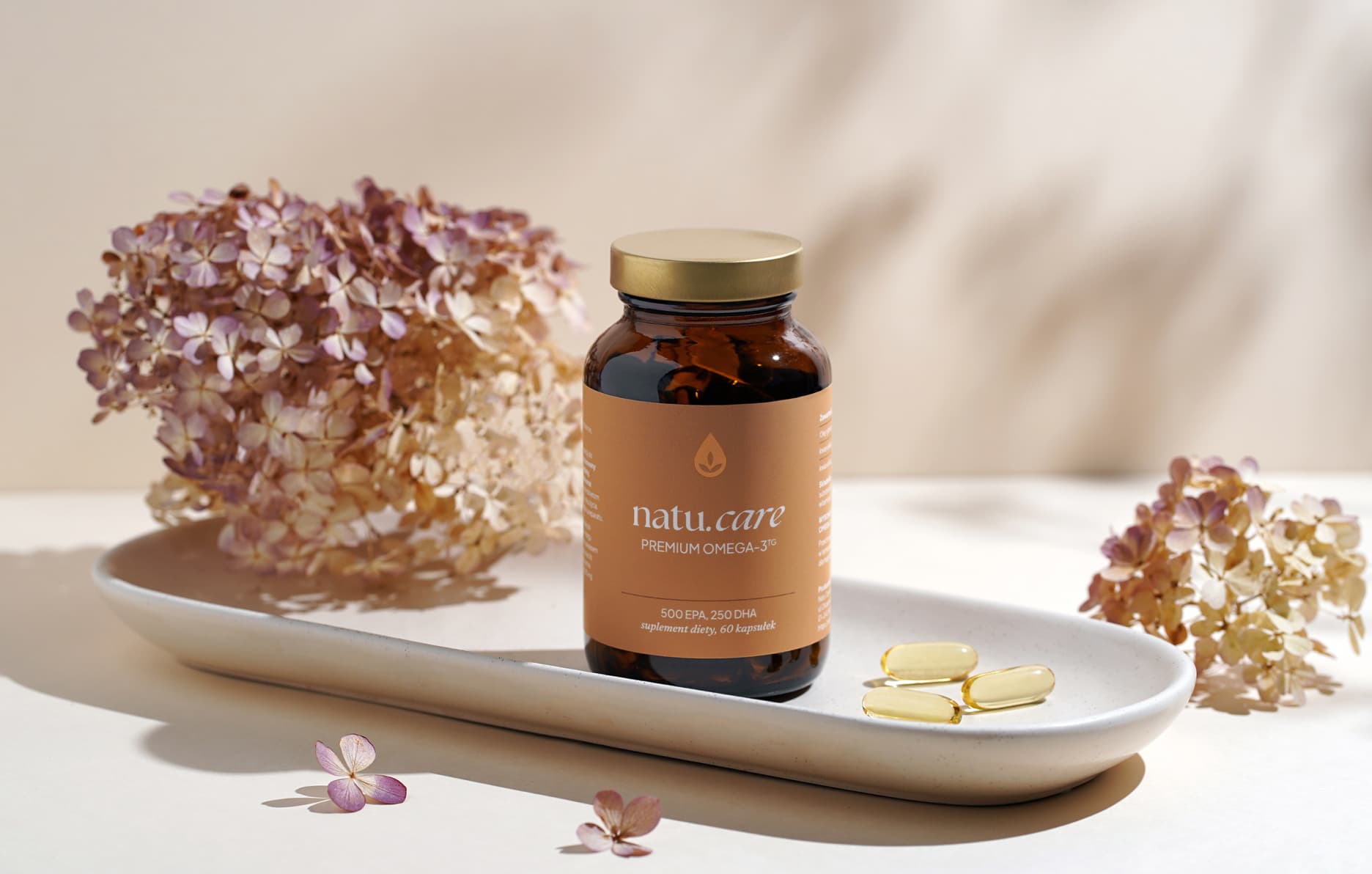
Sprawdź, za co pokochały go tysiące klientek Natu.Care Premium Omega-3ᵀᴳ -15% z kodem BLOG15
Natu.Care Omega-3ᵀᴳ Premium
Natu.Care Omega-3ᵀᴳ Premium dla zdrowia serca, mózgu i odporności. Najlepsza przyswajalność. Optymalna dawka 750 mg. Przebadana przez niezależne laboratorium.
Zobacz więcej
Produkt ma super skład, transparentną etykietę i co dla mnie jest ważne – małe kapsułki do połknięcia. Nie ma też nieprzyjemnego efektu odbijania rybą, który miałam spożywając inne produkty. Widzę znaczną poprawę odporności. Polecam!@Kasia P.
See also:
- What is the strongest collagen
- Does collagen supplementation make sense
- Collagen for runners
- Collagen deficiency
- Collagen excess
Summary
- The best collagen for joints is hydrolysed type II collagen.
- The best collagen for joints is hydrolysed type II collagen.
- Powerful collagen for joints supports joint health by participating in the production of joint lubricant, rebuilding cartilage tissue and improving joint flexibility.
- Powerful collagen for joints supports joint health by participating in the production of joint lubricant, rebuilding cartilage tissue and improving joint flexibility.
- It is assumed that the effects of collagen for joints can be seen after approximately 6 months of regular supplementation.
- Collagen for joints differs from collagen for skin only in the additional active ingredients that are supportive of the musculoskeletal system.
- Collagen for joints is not found in fruit or vegetables - it is an animal protein.
- Joint collagen can be supplemented by the elderly, athletes, people with joint disease and those who eliminate certain foods from their diet.
- There are some contraindications to the use of collagen, such as allergies, kidney and liver disease, pregnancy, breastfeeding, autoimmune diseases, medication and gastrointestinal problems.
- Collagen joint injections work by rebuilding damaged cartilage tissue in the joint and should be administered by a qualified healthcare professional.
FAQ
What is the best collagen to choose for your joints?
.The most powerful collagen for joints is hydrolysed collagen type II. It supports cartilage tissue and bones as it is responsible for their structure. It can also relieve joint pain and counteract osteoarthritis, for example. One such preparation is Natu.Care Premium Collagen.
It is sea collagen, which is extracted from wild caught cod living in Norwegian waters. The formula does not only support joints, but also hair, skin and nails.
Does collagen for joints work for skin?
.Yes, collagen for joints also has beneficial effects on the skin. As one of the main components of the skin, collagen helps to maintain its elasticity and firmness, slowing down the ageing process. Collagen supplementation can therefore support the health of the skin, improving its appearance and texture, as well as the condition of joints by affecting their mobility.
What's better for joints glucosamine or collagen?
.Both supplements, glucosamine and collagen, have benefits for joint health. Glucosamine has an anti-inflammatory effect and leads to regeneration of joint cartilage, helping to treat osteoarthrosis. Collagen, as an essential component of cartilage, also promotes cartilage regeneration and maintains joint flexibility.
Therefore, the choice depends on the individual's needs and health status - it is best to contact your doctor about this.
How to use collagen for joints
.Collagen for joints should be used as recommended by the manufacturer. Some of these formulations come in the form powder, which should be mixed in water or added to a smoothie or shake. Liquid collagen on the other hand, is already ready to consume. And taking collagen in capsules simply comes down to swallowing the right number of tablets.
Is collagen for joints with vitamin C and hyaluronic acid any good?
.Collagen for joints for the elderly and beyond should contain both hyaluronic acid and vitamin C in its composition. The latter further supports the production of collagen in the body and also facilitates its absorption. Hyaluronic acid, on the other hand, hydrates the joints, which supports the production of synovial fluid, responsible for the flexibility of the musculoskeletal system.
Does collagen help joints?
.Yes, collagen helps joints. Research suggests that collagen can positively affect cartilage and bone tissue - it is one of the building blocks of these elements. What's more, collagen can also relieve joint pain.
Is consuming enough collagen in the diet enough to support joint health?"
.Despite the fact that consuming collagen-rich foods such as jelly, meat or broth can be valuable, it is very difficult to provide the body with sufficient amounts of this nutrient through food alone. This is why supplementing the diet with collagen supplements may be essential, especially for the elderly, physically active and those suffering from joint disorders.
Is collagen supplementation safe for everyone?
.Although collagen is a natural component of the body and in most cases its supplementation is safe, there are some situations where caution should be exercised.
People with allergies to products from which collagen is extracted, patients with kidney and liver disease, pregnant and breastfeeding women, people with autoimmune diseases, those taking certain medications or those suffering from gastrointestinal problems should consult their doctor about the possibility of supplementation.
Is collagen only necessary for the elderly?
.No, although collagen production naturally declines with age, leading to loss of skin firmness, joint pain and other health problems, collagen is equally important for younger people, especially those who are physically active. Regular intake of this ingredient can help maintain the health and elasticity of skin, hair, nails and joints, regardless of age.
Can I make up for collagen deficiency with a plant-based diet?
.Unfortunately, collagen is not found in plant products - it is an animal protein. This means that people who don't eat meat or animal products may suffer from its deficiency. If you are on a plant-based diet, make sure you consume foods rich in vitamin C and amino acids that are needed for collagen production, such as kiwi, red peppers and nuts.
Sources
.See all
.Lugo, J. P., Saiyed, Z. M., & Lane, N. E. (2016). Efficacy and tolerability of an undenatured type II collagen supplement in modulating knee osteoarthritis symptoms: A multicenter randomized, double-blind, placebo-controlled study. Nutrition Journal, 15, 14. https://doi.org/10.1186/s12937-016-0130-8
Bello, A. E., & Oesser, S. (2006). Collagen hydrolysate for the treatment of osteoarthritis and other joint disorders:a review of the literature. Current Medical Research and Opinion, 22(11), 2221-2232. https://doi.org/10.1185/030079906X148373
Campos, L. D., Santos Junior, V. de A., Pimentel, J. D., Carregã, G. L. F., & Cazarin, C. B. B. (2023). Collagen supplementation in skin and orthopedic diseases: A review of the literature. Heliyon, 9(4), e14961. https://doi.org/10.1016/j.heliyon.2023.e14961
Clark, K. L., Sebastianelli, W., Flechsenhar, K. R., Aukermann, D. F., Meza, F., Millard, R. L., Deitch, J. R., Sherbondy, P. S., & Albert, A. (2008). 24-Week study on the use of collagen hydrolysate as a dietary supplement in athletes with activity-related joint pain. Current Medical Research and Opinion, 24(5), 1485-1496. https://doi.org/10.1185/030079908x291967
Czajka, A., Kania, E. M., Genovese, L., Corbo, A., Merone, G., Luci, C., & Sibilla, S. (2018). Daily oral supplementation with collagen peptides combined with vitamins and other bioactive compounds improves skin elasticity and has a beneficial effect on joint and general wellbeing. Nutrition Research (New York, N.Y.), 57, 97-108. https://doi.org/10.1016/j.nutres.2018.06.001
García-Coronado, J. M., Martínez-Olvera, L., Elizondo-Omaña, R. E., Acosta-Olivo, C. A., Vilchez-Cavazos, F., Simental-Mendía, L. E., & Simental-Mendía, M. (2019). Effect of collagen supplementation on osteoarthritis symptoms: A meta-analysis of randomized placebo-controlled trials. International Orthopaedics, 43(3), 531-538. https://doi.org/10.1007/s00264-018-4211-5
Jabbari, M., Barati, M., Khodaei, M., Babashahi, M., Kalhori, A., Tahmassian, A. H., Mosharkesh, E., Arzhang, P., & Eini-Zinab, H. (2022). Is collagen supplementation friend or foe in rheumatoid arthritis and osteoarthritis? A comprehensive systematic review. International Journal of Rheumatic Diseases, 25(9), 973-981. https://doi.org/10.1111/1756-185X.14382
Khatri, M., Naughton, R. J., Clifford, T., Harper, L. D., & Corr, L. (2021). The effects of collagen peptide supplementation on body composition, collagen synthesis, and recovery from joint injury and exercise: A systematic review. Amino Acids, 53(10), 1493-1506. https://doi.org/10.1007/s00726-021-03072-x
Kumar, S., Sugihara, F., Suzuki, K., Inoue, N., & Venkateswarathirukumara, S. (2015). A double-blind, placebo-controlled, randomised, clinical study on the effectiveness of collagen peptide on osteoarthritis. Journal of the Science of Food and Agriculture, 95(4), 702-707. https://doi.org/10.1002/jsfa.6752
Martínez-Puig, D., Costa-Larrión, E., Rubio-Rodríguez, N., & Gálvez-Martín, P. (2023). Collagen Supplementation for Joint Health: The Link between Composition and Scientific Knowledge. Nutrients, 15(6), 1332. https://doi.org/10.3390/nu15061332
Moskowitz, R. W. (2000). Role of collagen hydrolysate in bone and joint disease. Seminars in Arthritis and Rheumatism, 30(2), 87-99. https://doi.org/10.1053/sarh.2000.9622
Type II Collagen-An overview | ScienceDirect Topics. (n.d.). Retrieved 23 October 2023, from https://www.sciencedirect.com/topics/biochemistry-genetics-and-molecular-biology/type-ii-collagen
Zdzieblik, D., Brame, J., Oesser, S., Gollhofer, A., & König, D. (2021). The Influence of Specific Bioactive Collagen Peptides on Knee Joint Discomfort in Young Physically Active Adults: A Randomized Controlled Trial. Nutrients, 13(2), 523. https://doi.org/10.3390/nu13020523
.
Editorials
Meet the team


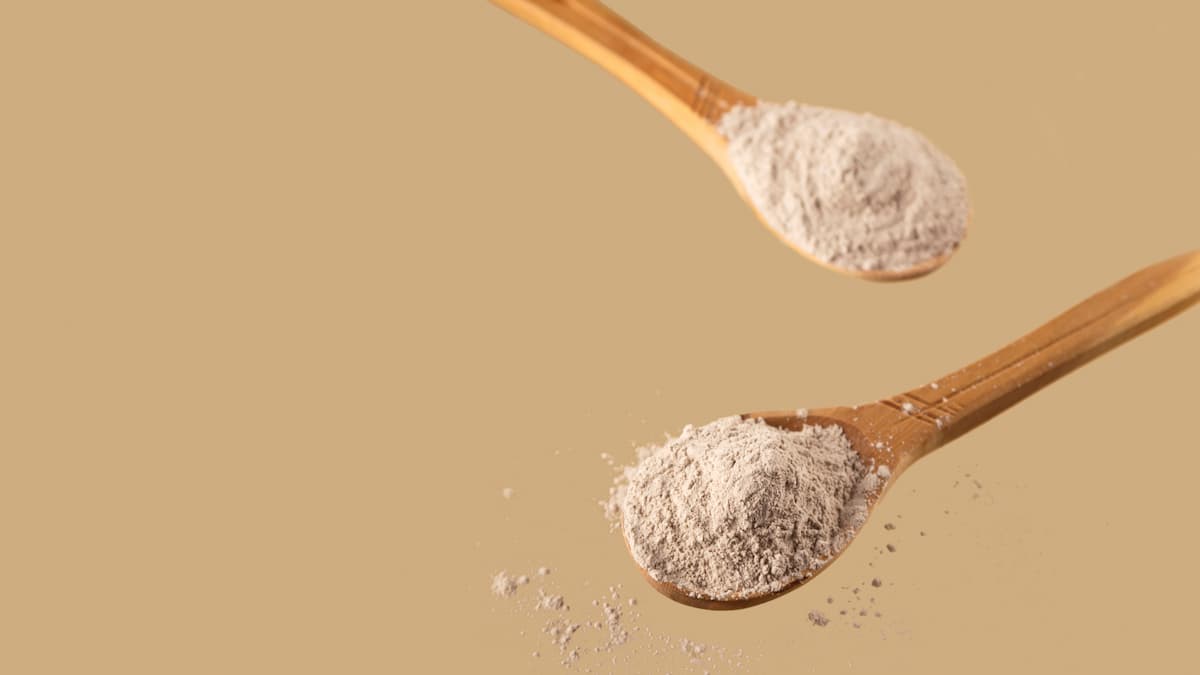
Everything you want to know about COLLinstant collagen.

Collibre collagen is an interesting supplement in shot form.

Solgar collagen with hyaluronic acid is a dietary supplement that supports skin and joint health.
